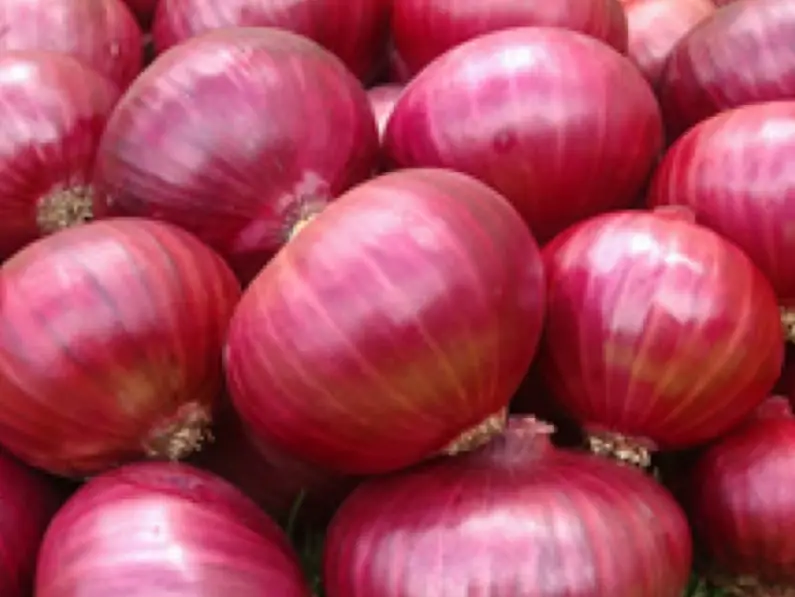
FULL POEM - SCROLL DOWN FOR LINE-BY-LINE ANALYSIS
Not a red rose or a satin heart.
I give you an onion.
It is a moon wrapped in brown paper.
It promises light
like the careful undressing of love.
Here.
It will blind you with tears
like a lover.
It will make your reflection
a wobbling photo of grief.
I am trying to be truthful.
Not a cute card or a kissogram.
I give you an onion.
Its fierce kiss will stay on your lips,
possessive and faithful
as we are,
for as long as we are.
Take it.
Its platinum loops shrink to a wedding ring,
if you like.
Lethal.
Its scent will cling to your fingers,
cling to your knife.

LINE-BY-LINE ANALYSIS
STANZA 1
Not a red rose or a satin heart.
The open line enforces a negative and abrupt tone and shows the speaker’s aversion to the traditional symbols of love – the ‘red rose’ and ‘satin heart’.
STANZA 2
I give you an onion.
This is a very definitive statement due to the nature of the short sentence structure. The ‘onion’ she is giving her lover as a gift seems unromantic and unusual, juxtaposing with the traditional romantic symbols of the previous line.
It is a moon wrapped in brown paper.
However, the poem shifts to a more romantic tone, as we would expect from a ‘valentine’ poem, as the speaker explains the reasoning behind her gift – saying it is ‘a moon wrapped in brown paper’. The ‘moon’ is white which symbolises a purity to her gift, its vast size = the strength and depth of love, and the fact that the moon is always present whether we can see it or not symbolises her perennial love for him, whether they are together or apart.
It promises light
The imagery of ‘light’ further builds on the positive description of the onion and the positive tone of the poem as a whole and signifies the almost divine hope and direction her love can provide. This imagery links to that of the ‘moon’ which radiates light during the night and conveys the feeling of her love guiding him through the darkness and the unknown especially in times of hardship. ‘Promises’ also suggests an infinite quality to her gift and is a metaphor for her commitment to her lover.
like the careful undressing of love.
The word ‘careful’ implies tenderness and gentleness to her love and ‘undressing’ suggests a sexually or emotionally charged intimacy. It could quite easily portray the building of their emotional connection by peeling away the layers to their heart.
STANZA 3
Here.
‘Here’ emphasises the fact that the speaker is directly addressing their lover, hence, emphasises the intimate nature of the poem.
It will blind you with tears
like a lover.
The tone shifts to become more serious and more emotionally difficult as the speaker describes the hardship that is a reality of love as the ‘tears’ can act as a symbol for the tough times in relationships.
It will make your reflection
a wobbling photo of grief.
The imagery is of someone looking into a mirror and seeing their ‘reflection’ as ‘a wobbling photo of grief’. Broken down, we can see the presence of an oxymoron in ‘wobbling photo’ as photos are stationary in reality. The effect of this is to show how far the person’s level of distress is from their normal emotions. This idea of emotional pain and sorrow is reinforced with the powerful, emotive word ‘grief’ which likens their torment to mourning.
STANZA 4
I am trying to be truthful.
The line is singled out which emphasises the importance of honesty in relationships. The short sentence creates a matter of fact, certain tone which is reminiscent of the definitive nature of truth.
STANZA 5
Not a cute card or a kissogram.
This line captures her opinion that the traditional Valentine’s Day traditions as fake, which juxtaposes the ‘truthful’ nature of her gift. Her disdain towards them is highlighted by the consonance of the ‘c’ and ‘k’ sounds which impose a sarcastic, perhaps slightly aggressive, tone.
STANZA 6
I give you an onion.
This line is repeated from the first stanza to emphasise its significance and allow the speaker to further elaborate on its prominence.
Its fierce kiss will stay on your lips,
This is one of the most thought-provoking images of the poem, mainly due to Duffy’s word choice of ‘fierce’. This symbolises the intensity of the passion the speaker feels, but it also conjures a feeling of ferocity and aggression to the love – a motif of the poem.
possessive and faithful
These two words are not that far away from being synonyms but do have subtle but very important differences, which Duffy plays off. Both suggest a sense of loyalty but, whereas ‘faithful’ connotes support, ‘possessive’ implies demand.
as we are,
for as long as we are.
‘As we are’ is repeated but in different contexts – the first is a simile concerning the ‘possessive and faithful’ elements of their relationship, whereas ‘for as long as we are’ mirrors wedding vows and reinforces the idea that their love is enduring that is throughout the poem.
STANZA 7
Take it.
This is an imperative urging the recipient to take the ‘onion’ . The urgency created adds to the significance of the gift and also further establishes the aggressive nature of the speaker’s love.
Its platinum loops shrink to a wedding ring,
‘platinum’ is a strong, precious, and expensive material which is a metaphor for the qualities of their relationship and the ‘wedding ring’ repeats the notion of their continual love. However, ‘shrink’ creates a more negative tone and is associated with restrictiveness – a negative of marriage.
if you like.
Lethal.
The tone suddenly shifts to a violent and destructive nature.
Its scent will cling to your fingers,
Again ‘Cling’ emphasises the permanence of their relationship but in a negative way. ‘Cling’ creates the image of wanting but not being able to escape from something. Suddenly the never-ending quality of their love might be a double-edged sword.
cling to your knife.
The image of the ‘knife’ links to ‘lethal’ and accentuates the possibly damaging and destructive nature of love. The fact that it is the final word adds significance as it represents the poet’s final conclusion about love and relationships and, evidently, this conclusion is one of pain and suffering.


